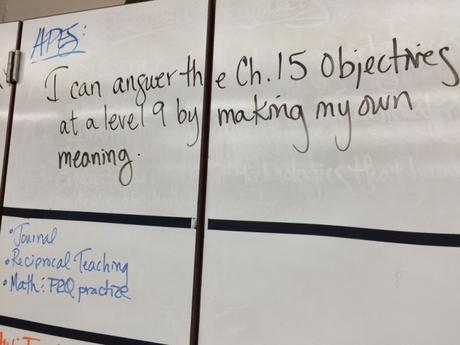So what's an AP teacher to do if she doesn't want to lecture to students who aren't learning and/or listening anyway? I've tried lots of things this year, but the one strategy I have tried that seems to have a big learning payoff is called reciprocal teaching. It allows students to practice thinking skills and make their own meaning, which, to me, is really one of the main objectives of school rather than talking about a whole bunch of content they will quickly forget in the first 6 months after graduation.
 Currently we are studying air pollution in APES. Rather than me copying down ideas, concepts, and diagrams from the reading that they already read about the night before (I have them read, highlight objective answers and do reading questions before doing this), I put them in groups of four and did the following:
Currently we are studying air pollution in APES. Rather than me copying down ideas, concepts, and diagrams from the reading that they already read about the night before (I have them read, highlight objective answers and do reading questions before doing this), I put them in groups of four and did the following:1) Each person was assigned one of four roles. Traditionally, the roles are Clarifier, Questioner, Summarizer, and Predictor, but I changed these up a bit to the four roles below:
- Summarizer - this person summarizes the answers to the I can statements, pointing out where they highlighted to come up with that summary. They DO NOT repeat the text - they summarize it in their own words!
- Questioner - this person generates 2-4 questions about the section to see if the rest of the group truly understands the answers to the I can statements. Think about these questions as a small progress check - read the objectives, read the text, and come up with 2-4 questions that see if students understand the main ideas for each objective.
- Vocabulizer - this person comes up with questions or small activities to make sure everyone understands the vocabulary included in each section AND how the vocabulary words are connected to each other.
- Relevance expert - this person comes up with questions or ideas that connect what's being discussed in each section to how it is environmentally relevant. In other words, why is what you're reading important environmentally?
2) I divided the chapter they read up into sections according to the objectives, and listed the page numbers for each section on the board.
3) Students then re-read (hello Common Core ELA standards!) each section, writing down what they were supposed to write down to fulfill their role.
4) When everyone is done reading, the Summarizer starts the discussion. I allow any other role to follow the Summarizer, but I insist that he/she go first so everyone can get a nice overview of the section. The discussion is timed ( I give them about 3-4 minutes) because I've had issues with off-task talk erupting if students are given any more time.
5) When students read a different chapter, I keep them in the same groups but switch up their roles. I keep them in the same groups until every person has had a chance to do each of the four roles.
6) I give students a chance to ask me questions after each round of reciprocal teaching in order to clear up any lingering issues they may have. Sometimes I give them a formative assessment at this point depending on student need or my need to see where they are at in their learning.
Often I ask questions to check for understanding between two sections, especially if I know a section covers important ground covered on the AP test. At other times I give students a chance to ask me questions about a section if I know that the section is difficult for students to understand.
Do my AP students like this? Nope. For some reason they feel this is a bit beneath them but, from the assessment evidence I have, this is what they need to do in order to be successful. My students aren't inclined to do a lot of reading outside of class, and their scores were dropping steadily. However, even though they don't like it, it has helped them improve their progress check (what I call quizzes and tests) scores nicely.
But beyond improving scores, it improves their thinking and meaning-making skills. Aren't good learners the ones that can summarize, clarify, acquire the meaning behind new vocabulary words, and connect their learning to make it relevant? And that's really what I want all of my students to be - good thinkers, and good learners. We've got to teach them those skills (yes, even to the AP kids!) in order for them to acquire those skills.
In my opinion, in order to do that students have to do the learning. Reciprocal teaching has them doing, not passively copying, listening, or watching.
